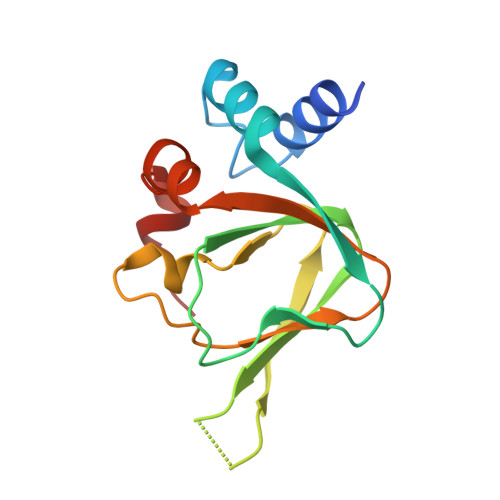Structural Basis of Analog Specificity in PKG I and II.
Campbell, J.C., Henning, P., Franz, E., Sankaran, B., Herberg, F.W., Kim, C.(2017) ACS Chem Biol 12: 2388-2398
- PubMed: 28793191
- DOI: https://doi.org/10.1021/acschembio.7b00369
- Primary Citation of Related Structures:
5J48, 5JAX, 5JD7, 5JIX - PubMed Abstract:
Cyclic GMP analogs, 8-Br, 8-pCPT, and PET-cGMP, have been widely used for characterizing cellular functions of cGMP-dependent protein kinase (PKG) I and II isotypes. However, interpreting results obtained using these analogs has been difficult due to their low isotype specificity. Additionally, each isotype has two binding sites with different cGMP affinities and analog selectivities, making understanding the molecular basis for isotype specificity of these compounds even more challenging. To determine isotype specificity of cGMP analogs and their structural basis, we generated the full-length regulatory domains of PKG I and II isotypes with each binding site disabled, determined their affinities for these analogs, and obtained cocrystal structures of both isotypes bound with cGMP analogs. Our affinity and activation measurements show that PET-cGMP is most selective for PKG I, whereas 8-pCPT-cGMP is most selective for PKG II. Our structures of cyclic nucleotide binding (CNB) domains reveal that the B site of PKG I is more open and forms a unique π/π interaction through Arg285 at β4 with the PET moiety, whereas the A site of PKG II has a larger β5/β6 pocket that can better accommodate the bulky 8-pCPT moiety. Our structural and functional results explain the selectivity of these analogs for each PKG isotype and provide a starting point for the rational design of isotype selective activators.
- Structural and Computational Biology and Molecular Biophysics Program, Baylor College of Medicine , Houston, Texas, United States.
Organizational Affiliation:

















